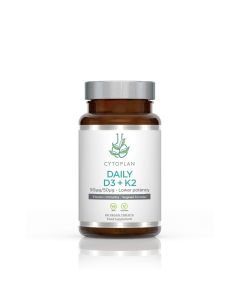Pregnancy and preconception (pre-pregnancy) are both exciting and stressful times. It is also an optimal time to support and nourish expectant mothers. Nutrient status of the mother has an impact on her health, her pregnancy and the health of the baby. At Cytoplan we are passionate about supporting mothers-to-be and provide safe, gentle and bioeffective food-based formulations to support all aspects of preconception, pregnancy, birth, postnatal recovery and breastfeeding.
As a foundation we recommend a high-quality pregnancy multivitamin and mineral to support optimum wellness and ensure the nutrition gap (difference between levels of nutrients for optimum health and what we obtain from the diet) is bridged. Our formulation for pregnancy is designed to bridge this nutrition gap and ensure that the most appropriate, absorbable and bioeffective forms of nutrients are utilised, hence optimising the health of mother and baby.
Our Pregna-Plan multivitamin and mineral, for pregnant women, provides optimum levels of all key nutrients including vitamin D3 (vegan), folic acid as methyl folate and vitamin B12 as methyl cobalamin (the most bioeffectives forms), alongside appropriate levels of iodine, gentle iron and wholefood calcium. Pregna-Plan is a Wholefood formulation and therefore nutrients are recognised by the body as they would be in food, allowing for optimised absorption within the body as well as being gentle, safe, and effective. This provides confidence that nutritional status is optimally supported.
Our Pregna-Plan multinutrient is not only supportive for pregnancy, but can also be utilised as a preconception supplement as well as support after birth for both postnatal recovery and whilst breastfeeding.
In addition to pregnancy multivitamin and minerals we provide other prenatal supplements that are fundamental to ongoing wellbeing during pregnancy. These include omega-3 fatty acids to support cognitive development of the baby, probiotics which have been shown to be essential for immune and digestive health of both mother and baby, as well as individual pregnancy vitamins and minerals such as methyl folate, vitamin D, vitamin C and magnesium which may be required at higher levels in specific individuals.
Best vitamins for pregnancy?
Firstly, it is important to use suitable pregnancy multi vitamin and mineral, to ensure optimal intake of all nutrients. It is ideal to look for a food based multi as they come complete with associated food factor which occur in wholefood. This ensure the products are recognised by the body and optimally utilised. Cytoplan's PregnaPlan multivitamin and mineral, for pregnant women, provides optimum levels of all nutrients including vitamin D3, folic acid in methyl folate (the most bioeffective form)and B12, with appropriate levels of iodine, iron and calcium.
Additional vitamins may be used if needed, for example:
Vitamin D - important for multiple functions including immune health, cognitive function and bone density. Particularly important if vitamin D levels are suboptimal.
Vitamin C - can safely be taken in pregnancy, is important as an anti-oxidant, immune support and supports collagen production, important for the production of connective tissues.
Folate (as methyl folate) - this is the most bioeffective form of folate, which is essential for normal development of the nervous system as the prevention of spina bifida.
Do you have vegan pregnancy vitamins?
Yes, Cytoplan's PregnaPlan is a vegan supplement and therefore suitable for vegans as are the majority of our products. We also have a Vegan Omega 3 containing the active forms EPA and DHA. DHA has been shown to support cognitive development and normal vision in babies.
What supplements for pregnancy should I consider?
A good quality food-based pregnancy multivitamin and mineral is important to bridge the nutrition gap (difference between nutrient intake for optimum wellness and what we are obtaining from the diet), therefore supporting the health of both mother and baby, Cytoplan's PregnaPlan is an excellent choice for this. It is also advisable to take an omega 3 supplement which has a good level of DHA, this is the predominant omega 3 fatty acid in the brain and contributes to cognitive development of the baby, I would recommend Cytoplan Omega 3 Vegan. Additionally, it is a good idea to support the health of the gut flora, this is essential for the immune and digestive system of the mother which is passed on to the baby during birth and breastfeeding to support the baby's immunity and digestion. I would recommend the Women's Biotic.













